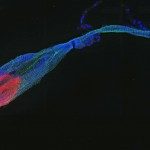Link to Pubmed [PMID] – 18848846
Mol. Biochem. Parasitol. 2009 Jan;163(1):1-7
Plasmodium encodes a family of six secreted multi-domain adhesive proteins, termed PCCps, which are released from gametocytes during emergence within the mosquito midgut. The expression and cellular localization of PCCp proteins predict a role either in gametocyte development or within the mosquito midgut during the transition from gametes into the ookinete stage. However, mutant parasites lacking expression of any single PCCp protein show a phenotype at the oocyst stage with a failure of oocyst maturation and sporozoite formation. In this study we investigated the stage-specific transcription of the PCCp genes of the rodent malaria parasite, Plasmodium berghei, and analyzed their promoter activities. Transcript expression analysis by quantitative real time RT-PCR showed that as in the human malaria parasite, Plasmodium falciparum, all PbCCp genes are predominantly transcribed in the gametocyte stage with a low level of transcription in the oocyst stage. Transgenic P. berghei parasites that contain the reporter protein GFP driven by the promoter regions of PbCCps showed pronounced GFP expression exclusively in gametocytes, in agreement with the RT-PCR data. To determine whether functional redundancies of different PCCp family members could explain the lack of a phenotype in gametocytes or gametes in single knockout mutant parasites, double gene null mutant P. berghei parasites were generated lacking either PCCp1 and PCCp3, or PCCp1 and PCCp4. The phenotype of these double knockout mutants was similar to that observed for single gene knockout mutants and manifest at the oocyst rather than the gametocyte or other stages within the mosquito midgut lumen.

